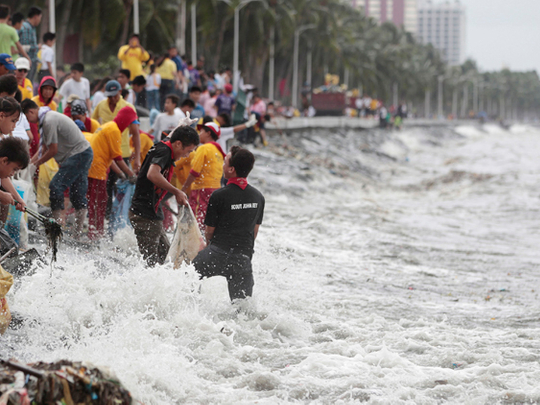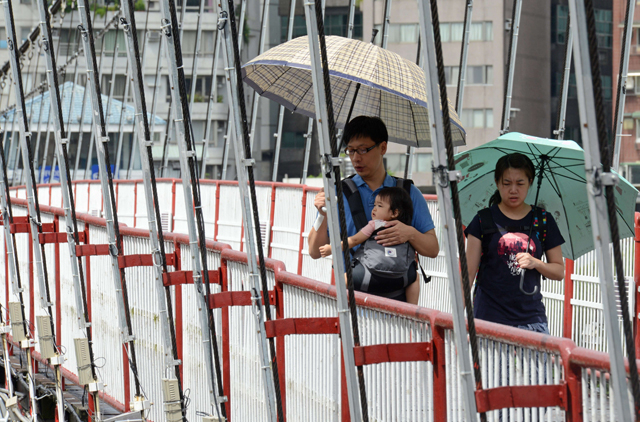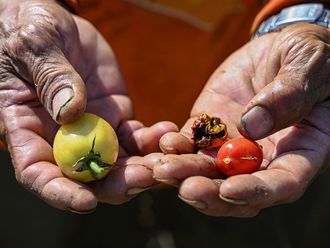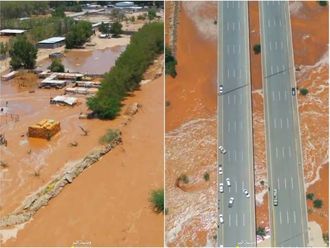
Manila: Super Typhoon Usagi, the most powerful storm of the year, brought torrential rain and ferocious winds to the Philippines and Taiwan on Saturday, uprooting trees, triggering giant waves and knocking out power as it barrelled towards Hong Kong.
The typhoon battered the Batanes island group in the far north of the Philippines overnight before flooding a Taiwanese village and forcing Hong Kong's flag carrier Cathay Pacific to preemptively cancel all its flights.
"This is the strongest typhoon to hit Batanes in 25 years," Dina Abad, the district's representative to Congress told AFP.
"The howling winds began at midnight and they churned up to 8 meter waves that damaged the port and sank moored fishing boats," she said, quoting a mayor of one coastal town.
She said coconut trees were torn in half or were uprooted, while terrified residents couldn't sleep as the storm battered roofs above their heads. The aviation tower at the island's airport was also heavily damaged.
"I think the estimate of the damage will be bigger tomorrow when have a clearer assessment on the ground," she said.
As of 5pm (0900 GMT) Usagi was 160 kilometres west of Batanes, churning gusts of up to 210 kilometres an hour as it headed towards the China's southern coast, according to Manila's weather bureau.
In Taiwan's southern Pintung county, a storm flooded a remote village, forcing troops to evacuate dozens of people, the state Central News Agency said.
"I thought a tsunami was hitting...I've never encountered this before in my life," it quoted a 60-year-old woman who was scrambling to safety with her pet.
Six people were also injured in Kinmen, a Taiwan-controlled island off China's southeastern Fujian province, after they were hit by fallen trees, according to the Central Emergency Operation Centre.
The typhoon also left 45,000 homes powerless and more than 5,000 households without water supplies, it said.
Flights were cancelled and ferry services suspended, with schools and offices in many parts of the island closed, especially in the south and east, which were expected to bear the brunt of the storm, authorities said.
Hotels and resorts in mountainous areas were closed due to fears of flooding and landslides.
Coastguards cordoned off the beaches at Kenting, a popular scenic spot in the south, as strong winds whipped up the sea.
The defence ministry has deployed more than 3,000 soldiers to "high risk" areas and placed 24,000 others on standby.
Nearly 3,000 people had already been evacuated, officials said, as the Central Weather Bureau warned people to expect up to 1.2 metres of rain.
In Hong Kong, officials issued a standby signal number one, the first in a five-step tropical cyclone warning system with winds expected to strengthen later in the day and on Sunday.
Flag carrier Cathay Pacific said in a statement it was suspending operations for two days from Sunday, as the territory braced for Usagi's impact.
"It is anticipated that disruptions will continue on 23 September, Monday," the airline said in an advisory, as the Hong Kong observatory warned that weather "will deteriorate significantly" as the storm approached.
Operators at the city's port, one of the busiest in the world, said they would cease work late on Saturday.
China's National Meteorological Center issued a red alert - its highest level warning - as it forecast gale-force winds and heavy rain.
It said Usagi would affect the coastal areas of the provinces of Guangdong, Zhejiang and Fujian as it moved northwest.
Nearly 23,000 fishing boats had earlier taken shelter in Fujian province ahead of the storm, state media reported Saturday, while more than 4,000 people living in coastal areas were evacuated.











_resources1_16a3106a819_small.jpg)

